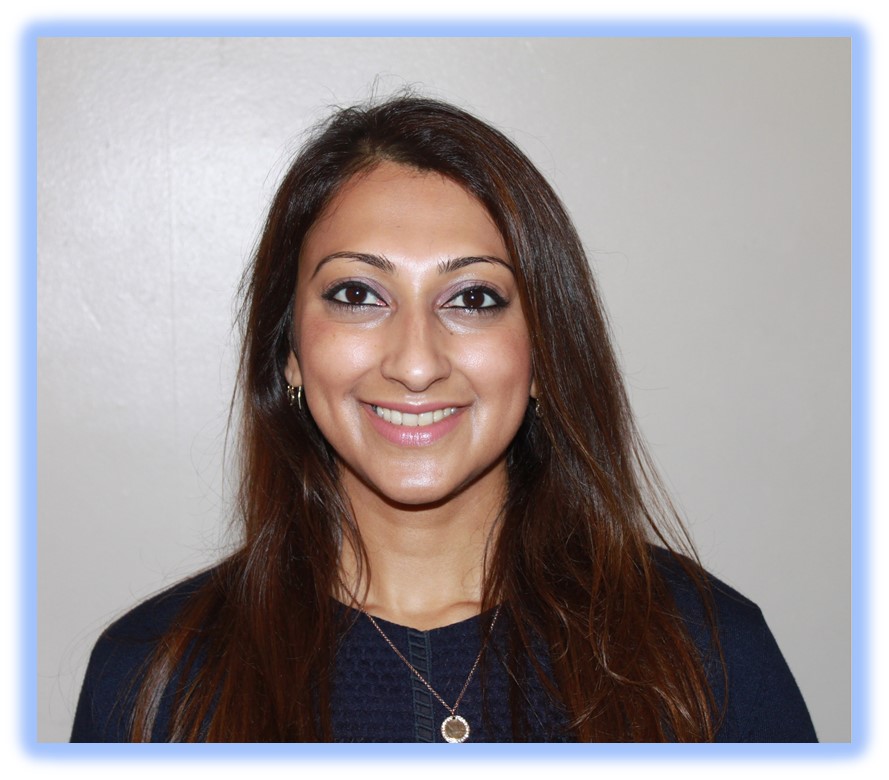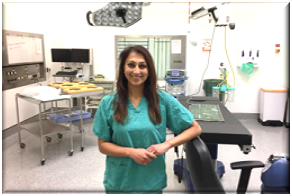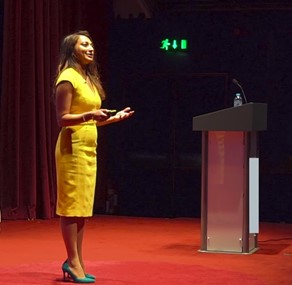Poetry and Art in Surgery
 Shabnam Parkar
Shabnam Parkar
Consultant Paediatric Surgeon
St George’s Hospital
As far as I knew I had two passions in life, surgery and poetry. I used to read and write a lot of poetry as a child, I loved how emotions and themes could be illustrated with a few words arranged in certain ways, enough to help you paint a fuller picture; see and feel that landscape in all its glory. It allows your imagination to complete the silences, the gaps. That is what creativity is.
When I was a medical student in London, I discovered spoken word (performance poetry). It was quite an underground scene back then 20 years ago. I stumbled upon a fortuitous email that landed in my inbox one day, it was about an open mic event in central London and I decided to go. That day changed me. I wrote a piece of poetry on the train on my way there, it was something impromptu in that moment. It was such a great event, I met wonderful poets and writers who were all supporting each other’s creativity, sharing their work, talking about new ideas. The poem was well received amongst these professionals, I got good feedback and these people ended up being great friends in the years to come. We would meet every week, try out new material and ideas, critique and give feedback, and we would perform in venues around London in the evenings. Fellow students and later work colleagues were not aware of this other side of me. I was afraid I wouldn’t be taken seriously as a doctor, as a surgeon, if I showed I had this other passion in my life. It almost felt like living a secret life.
Creativity is the ability to transcend ways of thinking or acting, and to develop new and original ideas, methods or objects.
However, the more I thought about it, I realised that there was so much more in poetry and it complemented what we do in medicine. Just as poetry would take a complex set of emotions or experiences and put them into a concise arrangement of words and lines, medicine is the same. We would take a full history, examination, and investigations and then formulate a concise diagnosis, with differentials and a management plan. You can read between the words in a poem and fill in the silences with your imagination, and you see the fuller picture; subsequently you create something. When you see a patient, you rely a lot on non-verbal cues, as well as verbal, to give you information. You can often pick up a lot from careful observation, and you use your knowledge and experience to fill in the gaps that you observe. I found that what I embraced in poetry, it would help me in my work as a paediatric surgeon. We treat babies and children, they cannot always verbalise so we rely more on observation and non-verbal cues. It made me pause, observe the gaps, those silences and really take in what was going on. These observations to pick up signs, give clues as to the cause of disease and their effects, would also help me understand the burden of the illness to the child and to the family. It would allow me to make an informed decision on the correct management for that child. Ultimately, it helped me connect to my patients on a more human level.
Poetry, I found, really helped me rediscover the art in surgery.

The more I looked, the more I saw the art in surgery. It is in our descriptions, in our movements. We call our base the operating theatre, where we ‘perform’ the operation. Each person has their role to play, the anaesthetist, the scrub nurse, the surgeon. We scrub, our prep to warm up and get in the zone; we don our gowns as if putting on our ‘costumes’ to play our roles. We each have a part to play in this performance of intricate detail, purposeful movement, and the common aim to cure or remove disease. It is a complex interplay of verbal and non-verbal communication between each of the team members. The surgery itself, is like art. Our pen is the scalpel and our canvas is the human body. The intricacies of human anatomy and physiology can signpost us to the disease and hence the treatment. We have to be humble and observant enough to see the signs that the body gives us, whether these are known anatomical landmarks to help you find your way in a laparotomy or getting a feel to find the right plane when dissecting a mass or when in a frozen abdomen.Poetry is art and art has many forms including literature, paintings, sculpture music, cookery, building etc. Medicine has often been considered an art as well as a science. In fact, many centuries ago, medicine was first considered under the premise of ‘natural philosophy.’ These two disciplines, art and science, can often complement each other, one can provide insight in situations where the other can lack. They are not always exclusive entities; you can see one in the other.
In these current times where burnout is often discussed or experienced, we find that creating outlets to channel these anxieties and feelings can salvage a lot. We deal with life and death on an almost daily basis. Going back to our hobbies and talents, really help us to deal with and offload challenges at work, whether that workload is physical, emotional or mental. Poetry and writing helped me to process and deal with emotions I use to have from early in my training. I learned a lot from that and I feel it helps me see the bigger picture now.

I now embrace what I have learnt in my day to day working as a consultant. At times when I ask my medical students about what they have learnt, I sometimes ask them to write a poem, in whatever form they want, on a patient or condition that really impacted them. They often feedback that it really made them look deeper and understand the processes and effects. I was asked to give a TEDx talk in London in 2018 on poetry and surgery. It almost felt like one of the first declarations to my colleagues about that side of my life. I was probably more nervous telling them about it rather than actually speaking on the TEDx stage!
Below is a piece I wrote whilst I was a senior trainee. There was a baby born with a life-limiting syndrome and our primary aim was to allow comfort and dignity in their last moments. The loving care I saw from the mother to her child, happiness rather than sadness, had a profound effect on me and compelled me to write this piece:
The Beautiful Mistake
You were the miracle that perhaps life forgot
A delicate derangement of DNA
A beautiful mistake
But you chose to live
Briefly
In the chaos of this world
Paper like skin
Your veins are visible
Threads pumping dark congested blue all around
Because your heart chose not to cope
Minute fingers intricately wrapped around your mother’s own
Your eyes do not comprehend
But your senses know
That you are in her arms
Your perfect imperfections for her to admire and caress with love
You do not need to know
That science had failed to cure you
That this was futile
Because it wasn’t…not in your mother’s eyes
You do not need to know that the drip had finished hours ago
Or the ventilation machine switched off
It doesn’t matter
Because you can now be held in her tender arms
Like you were always meant to be
And as we watch helplessly in silence
Stealing the oxygen from your delicate lungs
As we ourselves continue breathing with no discomfort
Your struggle deepens which each and every breath
A silent cry for one more try
Your mother, your perfect angel
Holds you with heart-breaking delicacy
And that’s all you ever need to know
For her, you were never a beautiful mistake
Only beautiful
She sings you a lullaby
In the tongues of her ancestors
A gentle kiss
A tender pray
And her only wish is that you live to feel the sun on your skin
Whilst you lay in her arms. Just once, Just once,
Before your last goodbye…….
Art can be considered as a diverse range of activities involving the conscious use of creative imagination to express technical proficiency, beauty, emotional power, or conceptual ideas.
Shabnam Parkar
TEDx Talk:
Curated by Mark Davenport, March 2021